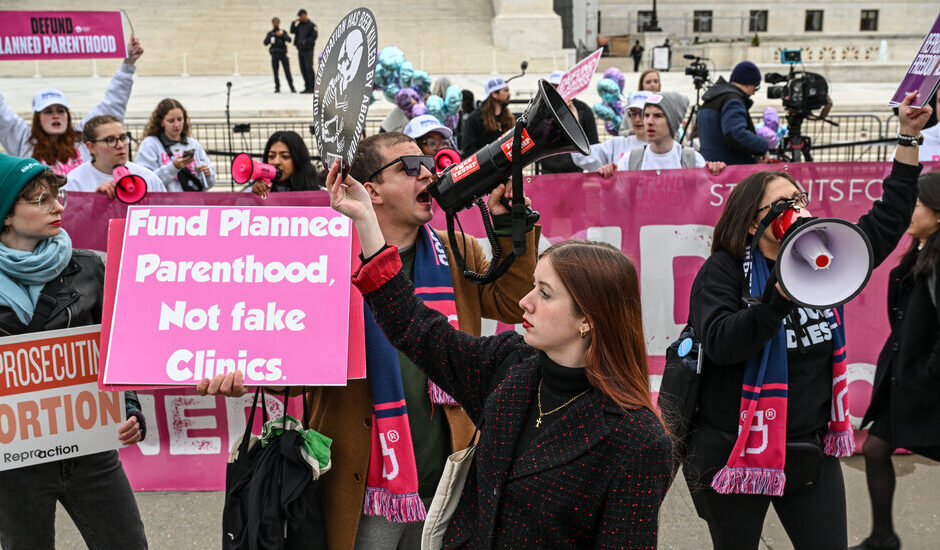The Supreme Court heard arguments on Wednesday in a case arising from South Carolina’s attempt to deny funding to Planned Parenthood. But the question the justices grappled with was a relatively narrow one, focused on whether individuals may sue the state to obtain medical services from Planned Parenthood unrelated to abortion.
In 2018, Gov. Henry McMaster of South Carolina, a Republican, ordered state officials to deny Medicaid funds to Planned Parenthood, saying that “payment of taxpayer funds to abortion clinics, for any purpose, results in the subsidy of abortion and the denial of the right to life.”
Medicaid gives federal money to states to provide medical care for poor people, but it sets some conditions. One is that eligible participants may receive assistance from any provider qualified to perform the required services.
Abortions are banned in South Carolina after six weeks of pregnancy, and, even then, federal law prohibits the use of Medicaid funding except in life-threatening circumstances or in cases of rape or incest. But Planned Parenthood clinics in Charleston and Columbia provide services unrelated to abortion, including counseling, physical exams, contraception and screenings for cancer and sexually transmitted infections.
Planned Parenthood and a patient who sought contraception sued under a federal civil rights law, and a federal trial judge blocked the South Carolina directive, saying that it ran afoul of Medicaid’s requirement that patients may choose any qualified provider.
The litigation that followed was convoluted and circuitous, focusing largely on whether that provision created a right that individuals could enforce by filing lawsuits. The Supreme Court has said that federal laws like Medicaid, which give money to states but only if they accept certain conditions, must “unambiguously confer individual federal rights” to give affected individuals the right to sue.
That is a hard test to meet, and the court has ruled that it has been satisfied only rarely, most recently in 2023 in Health and Hospital Corporation of Marion County v. Talevski, a case concerning nursing homes. The statute at issue in that case repeatedly referred to “rights” as such, while the Medicaid provision in the new case used different language.
It said people seeking medical services “may obtain such assistance from any institution” that is “qualified to perform the service or services required.”
Nicole A. Saharsky, a lawyer for Planned Parenthood, acknowledged that the standard was strict.
“It is a high bar to find that Congress put in place an individually enforceable right,” she said. “What we’re saying is that this provision meets the bar.”
Kyle D. Hawkins, a lawyer for the Trump administration, disagreed, saying the Medicaid provision lacked the required “unmistakable rights-creating language.”
Under the Biden administration, the government had taken the opposite position, which Mr. Hawkins acknowledged.
“With the change in administration,” he said, “the federal government re-evaluated its position in this case, and we believe that the view we’re advancing today is the best reading of the statute.”
The justices discussed at length whether Congress had to use “magic words” to allow people to sue. John J. Bursch, a lawyer with the Alliance Defending Freedom, a conservative Christian group that represents South Carolina, proposed a series of words Congress could use to grant an unambiguous right to sue.
“The list I would give you is rights, entitlement, privilege and immunities,” he said, adding that they did not amount to magic words.
In response, Justice Brett M. Kavanaugh said, “I’m not allergic to magic words because magic words, if they represent the principle, will provide the clarity that will avoid the litigation that is a huge waste of resources for states, courts, providers, beneficiaries and Congress.”
Justice Elena Kagan said the language in the Medicaid law could hardly be plainer. “The state has to ensure that individuals have a right to choose their doctor,” she said. “That’s what this provision is.”
Last year, a unanimous three-judge panel of the U.S. Court of Appeals for the Fourth Circuit, in Richmond, Va., ruled that the suit could proceed.
“This case is, and always has been, about whether Congress conferred an individually enforceable right for Medicaid beneficiaries to freely choose their health care provider,” Judge J. Harvie Wilkinson III wrote for the panel. “Preserving access to Planned Parenthood and other providers means preserving an affordable choice and quality care for an untold number of mothers and infants in South Carolina.”
He added that “this decision is not about funding or providing abortions.”
Abortion was mentioned only in passing in Wednesday’s argument in Medina v. Planned Parenthood South Atlantic, No. 23-1275, and the case did not turn on the state’s reason for trying to disqualify Planned Parenthood. But Ms. Saharsky said the dispute presented issues beyond a technical one about who can sue.
Congress, she said, had tried to send a message: “We want people on Medicaid who are insured through Medicaid to have the same right that people who have private insurance enjoy because it’s so foundational to individual dignity and individual autonomy.”
#Justices #Weigh #Challenge #South #Carolinas #Bid #Defund #Planned #Parenthood


